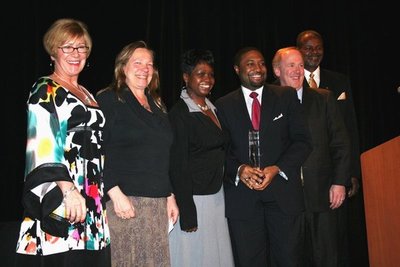March 12, 2009
UW named Government Agency of the Year for its work with minority-owned businesses
The University of Washington was recognized recently as the 2009 Government Agency of the Year by the Northwest Minority Supplier Development Council. The UW bested the cities of Seattle and Tacoma, King County, Sound Transit, and the Office of Minority and Women’s Business Enterprises in garnering the award.
The council is a nonprofit organization dedicated to improving the relationship among major corporations, public agencies and minority-owned businesses.
Shaun Spearmon, manager of the Business Diversity Program, said some of the key factors distinguishing the UW from the other government nominees were the significant increase in the number of relationships facilitated between campus decision makers and minority-owned businesses, nearly doubling the dollars spent with minority-owned businesses in the past year, and the process the UW has created to measure the success of its supplier diversity efforts going forward.
“The award really is an honor for the University as a whole,” says Spearmon, who describes the BDP’s mission as ensuring that the businesses that serve the University reflect the diversity of the state’s business community. Spearmon and Lynn Beck staff the program, but Spearmon gave kudos to the program’s steering committee for helping to spread the word about the value of working with diverse businesses. He also credits much of the program’s initial success to key senior level support from advisory board members like V’Ella Warren, senior vice president for Finance and Facilities, Richard Chapman, associate vice president for the Capital Projects Office, and Sheila Edwards-Lange, vice president for Minority Affairs and vice provost for diversity.
Since the office was created about a year ago, Spearmon and Beck have been tireless in trying to meet with anyone who has significant say over what gets purchased by administrative and academic units. So far, they have met with people from about half of the UW’s schools, colleges and departments.
“We usually begin by showing them a PowerPoint that poses the question: What percentage of UW purchases do you think are made from diverse businesses?” Spearmon says. “They are shocked when they find out that it’s less than 1 percent. In virtually every case, people think we should be doing better than that and they want to help.”
The program has helped to expand the pool of potential suppliers and to make this pool more visible. There is now a searchable database of diverse companies which can be accessed by company name or commodity. The program is also helping small businesses navigate what from the outside may look like a purchasing maze. “It’s tough for a small business to become more visible in such a decentralized environment,” Spearmon says. “Our goal is to help make the process more transparent.”
The current economic climate has produced a steady flow to the BDP office of businesses that may not have worked with public sector clients before but are compelled by circumstances to expand their customer base. “We tell businesses that those involved in purchasing decisions are increasingly cost-conscious,” Spearmon says, “but if you have some competitive advantages it definitely is worth your while to try and work with the UW.”
One of the challenges the program intends to tackle in the coming year is addressing “second tier” suppliers. These are the companies that supply goods and services to the firms that work directly with the UW. “We are working with Purchasing Services to begin tracking the utilization of diverse businesses by the UW’s first tier suppliers,” Spearmon says. “We want to acquaint them with the UW’s goals for working with diverse businesses and how they can benefit from developing a more diverse purchasing strategy.”
This strategy already has been employed while working with the Capital Projects Office on the construction of PACCAR Hall in the Foster School. “We believe that PACCAR Hall has the highest percentage of diverse businesses of any General Contractor/Construction Manager project on campus,” Spearmon says. “We began talking with Sellen Construction long before the project began, and they’ve worked hard to attract a diverse group of subcontractors.”
Spearmon and Beck are planning to hold more workshops for businesses and potential clients, not just in Seattle but in Tacoma, Bothell and at Harborview. The purpose is to bring together representatives of diverse companies with individuals who are responsible for major purchasing decisions; a workshop like this was held just over a year ago by the Capital Projects Office for architects and engineers.
“Working with the UW can be challenging for new companies because there are several colleges/schools and departments that make procurement decisions,” Spearmon says. “Understanding the UW procurement processes and being able to access the right decision-makers is critical.”



